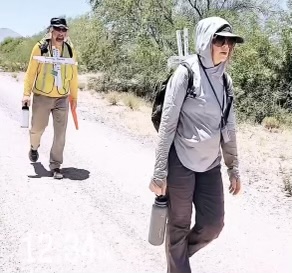Provost Jake Bucher reflects on 21st Migrant Trail Walk
During Memorial Day weekend, Provost Jake Bucher and Director of Curriculum and Intercultural Programming for the Center for Service Learning Melissa Nix participated in the Migrant Trail Walk, a 75-mile week-long walk from Sásabe, Sonora, Mexico to Tucson, Arizona in remembrance and solidarity with those migrate through the Altar Valley. Below is Provost Bucher’s reflection on the walk.
Jose Angel Hernandez. Gonzalez Barrera. 46 and 31, respectively, and respectfully when they passed, accompanied me for 75 miles from just on the Mexican side of the U.S. border through to Tucson, Arizona. Along with 33 other participants and their own passed companions remembered on crosses they carried, we completed this year’s Migrant Trail Walk during the week of Memorial Day. We called out the names of our passed brothers and sisters when we crossed the border, when we passed through a Border Patrol checkpoint, and each time we made camp. We called their names to carry their dreams forward and so the wind would carry their names and memories back to their families and loved ones. As each walker called the name on their cross, the group shouted a resounding “PRESENTE!”
The Migrant Trail Walk is in its 21st year of bearing witness to the tragedy of migrant death and standing in solidarity to bring attention to the need for improved immigration responses that end and prevent this tragedy. The organizers of the Walk did not think they would still be walking 20 years later, and yet from the end of the 2023 walk to the beginning of the 2024 walk - 191 remains were found in the Arizona desert. These 191 include children, and are a certain underreport as there are unknown other deaths and disappearances. These are the casualties of the pyrrhic defeat that is our current approach to immigration, an approach that openly pursues death as a deterrent. But, failing to achieve a deterrent effect, we are left with just death - and regardless of one’s position on immigration, death cannot be an acceptable outcome.
The walk was grueling at times, with a dangerous heat and physical toll. But it by no means is meant to be - nor could it be - a simulation. We had plenty of water, an embarrassment of food, and an option to ride when you were unable to walk. Additionally, we were not being hunted, when I left I knew I would see my family again, and during the walk I knew with certainty what would be on the other side of the journey. The empathy born from the walk is not from a shared experience, but from a shared humanity as I could feel Jose and Gonzalez each of the 75 miles and each of the over 200,000 steps. Wondering what made them take this risk, wondering what they left behind, wondering what their final thoughts were. Talking to them about my family, my life, about how I think I understand because I would do anything for my family, and about how this walk is only a small fraction of their experience - so how real was their strength, their fear, their courage. As a Sociologist I have studied, taught, and published about migrant rights, yet this was all at an intellectual level. This experience has effectively, and permanently, moved this issue from my head to my heart. It has also inspired me to look more local. Migrant death is a horrible tragedy, but even for those who “make it” - including those who make it to Denver - they experience continued tragic circumstances and are in need of the same accompaniment.
While Jose and Gonzalez were present with me on the walk and will remain present with me forever, I was present with them and was honored to carry their names to finish their journey. When I received the information from Melissa Nix (who finished her second walk this year), the call to be present rumbled deep in me. Yet different from the physical and mental struggles of completing the walk, there were numerous logistical, family, expenses, etc. struggles just to get to the walk. We walkers were thanked for our sacrifice, and a Franciscan brother walking with us responded that this kind of effort is not a sacrifice, it’s an offering. And that’s one of the things I hope to take forward - the commitment and the offering to be present. I often tell my students that there is no way to be passively anti-racist, passively anti-bigotry and oppression, etc. - it requires action, it requires your presence. Being present is another framing of walking with the marginalized, so be present for those who cannot be, be present in the issues that trouble humanity and our earth, and with your actions you will announce that you are “PRESENTE!”
If you would like to learn more about the Migrant Trail Walk and may be interested in participating, please contact Jake Bucher or Melissa Nix. Similarly, if you would like to learn more about how to get involved with migrant support efforts in Denver, Melissa or Nicki Gonzales can help connect you.
